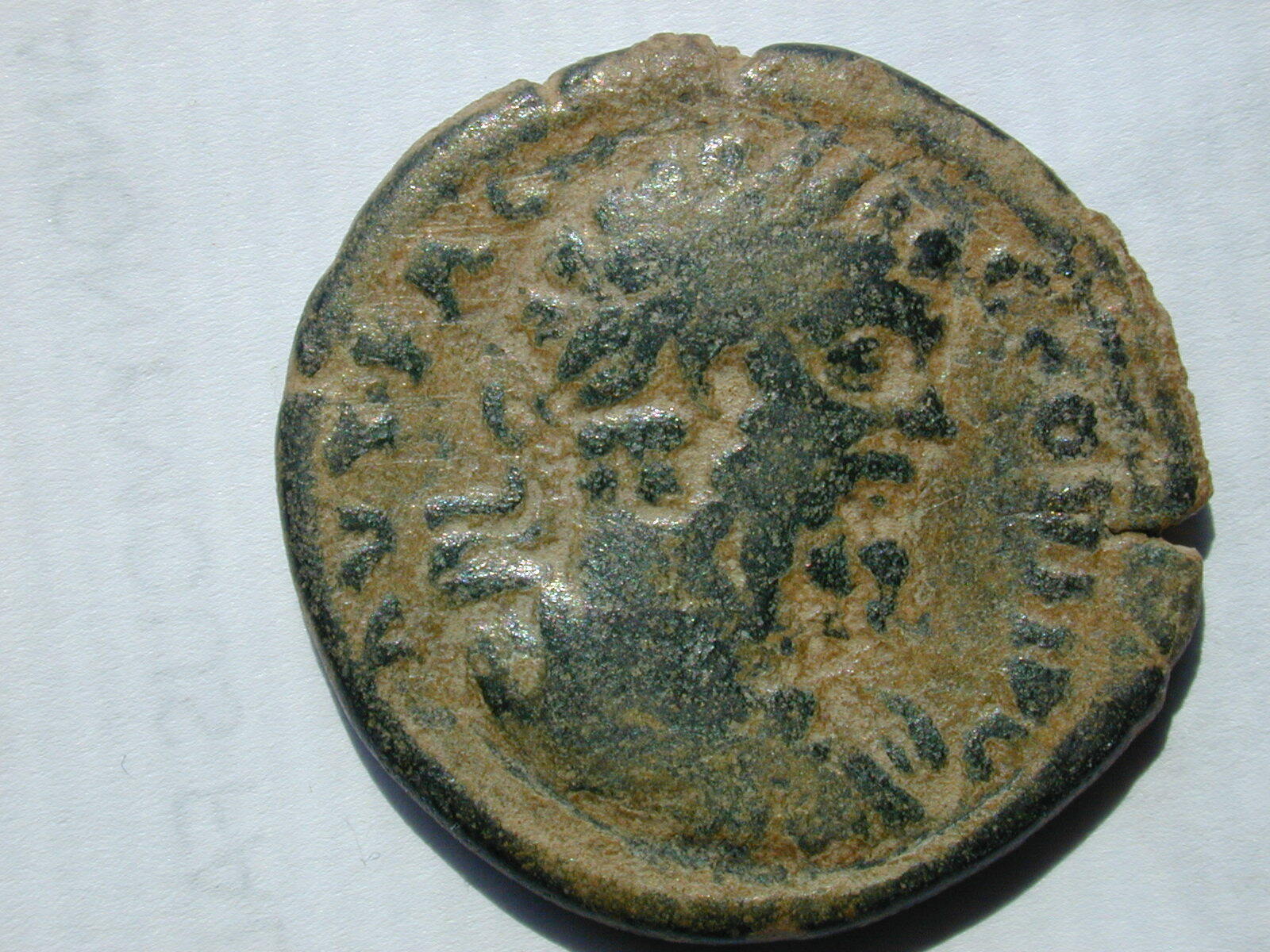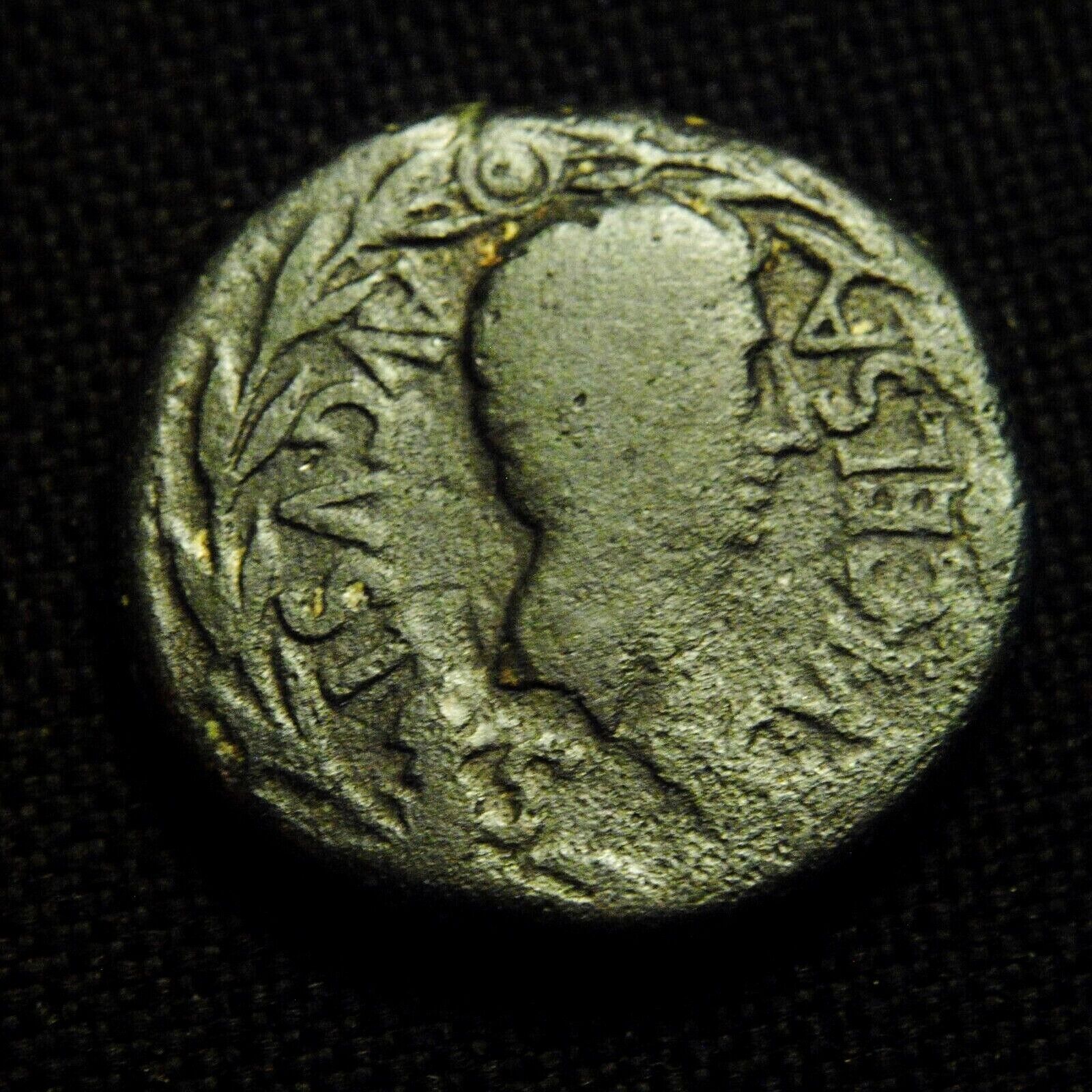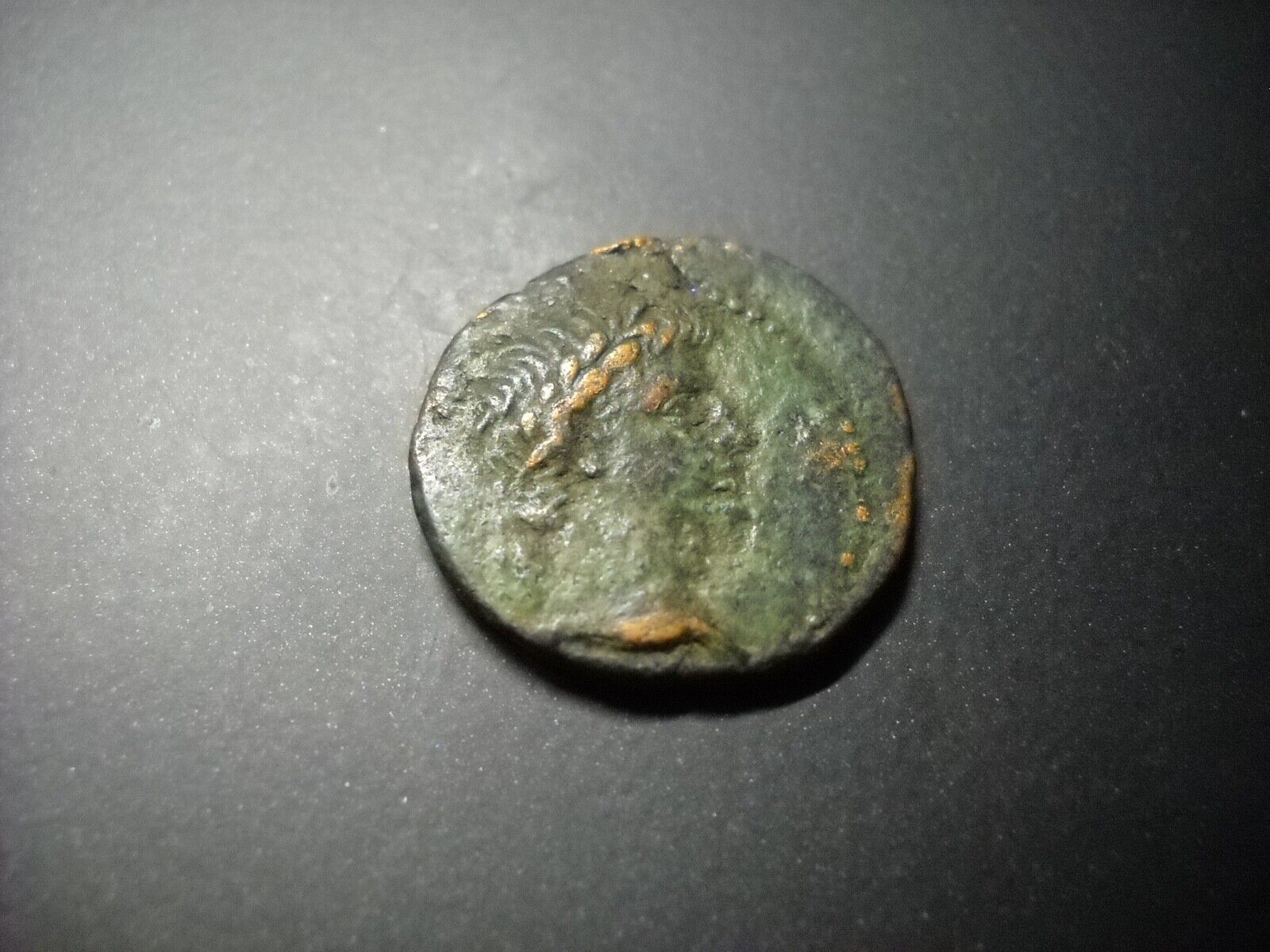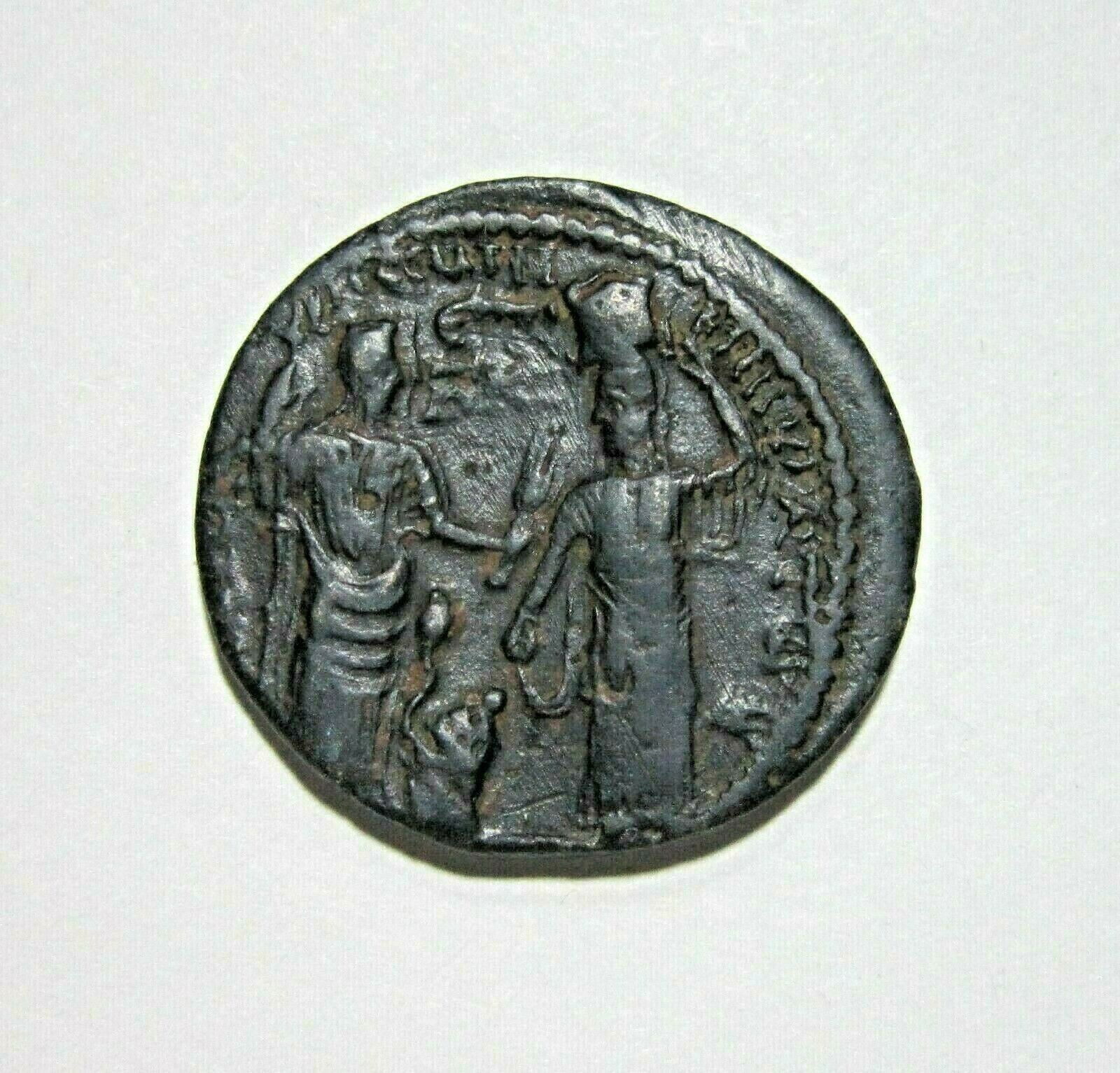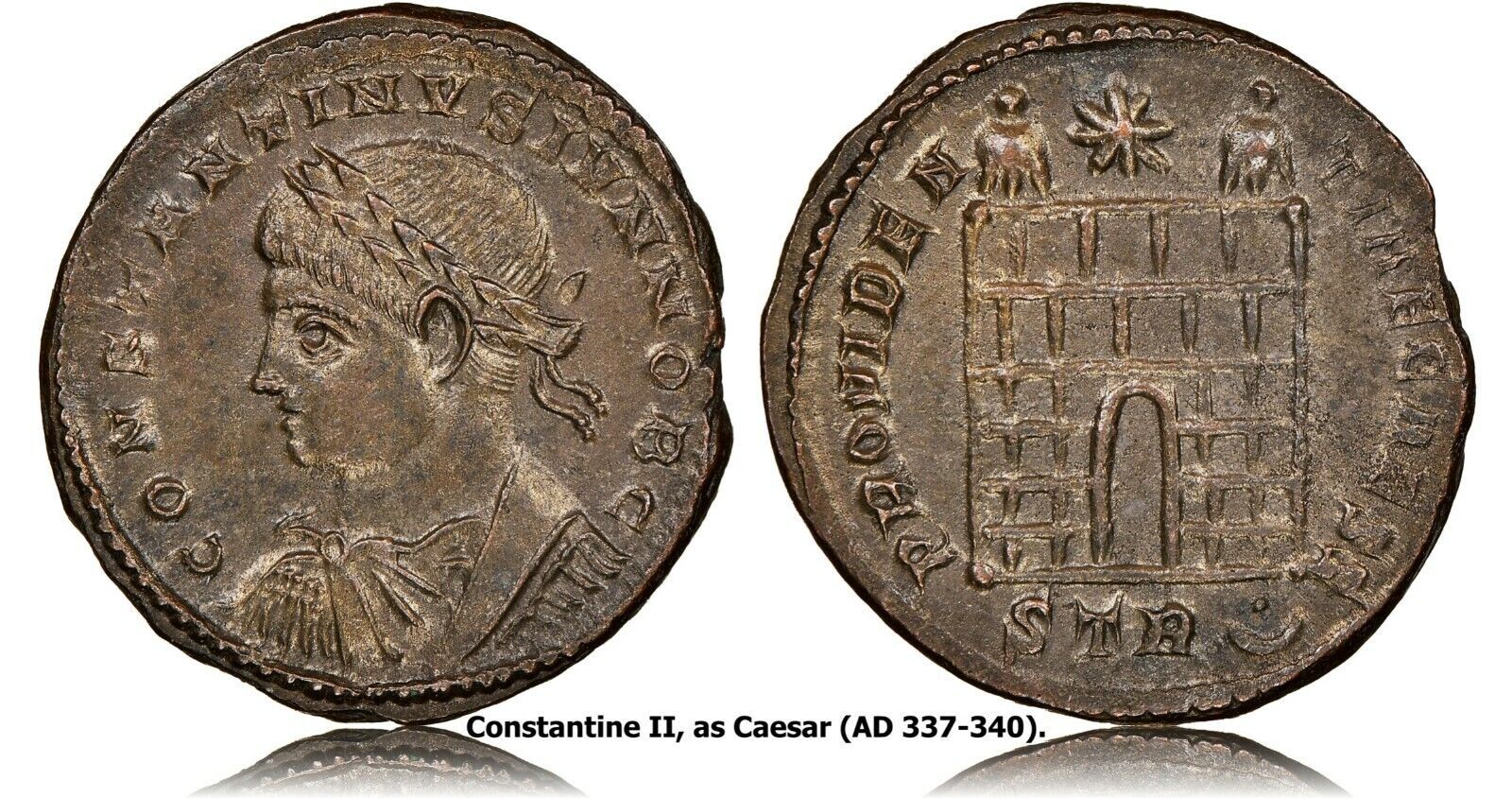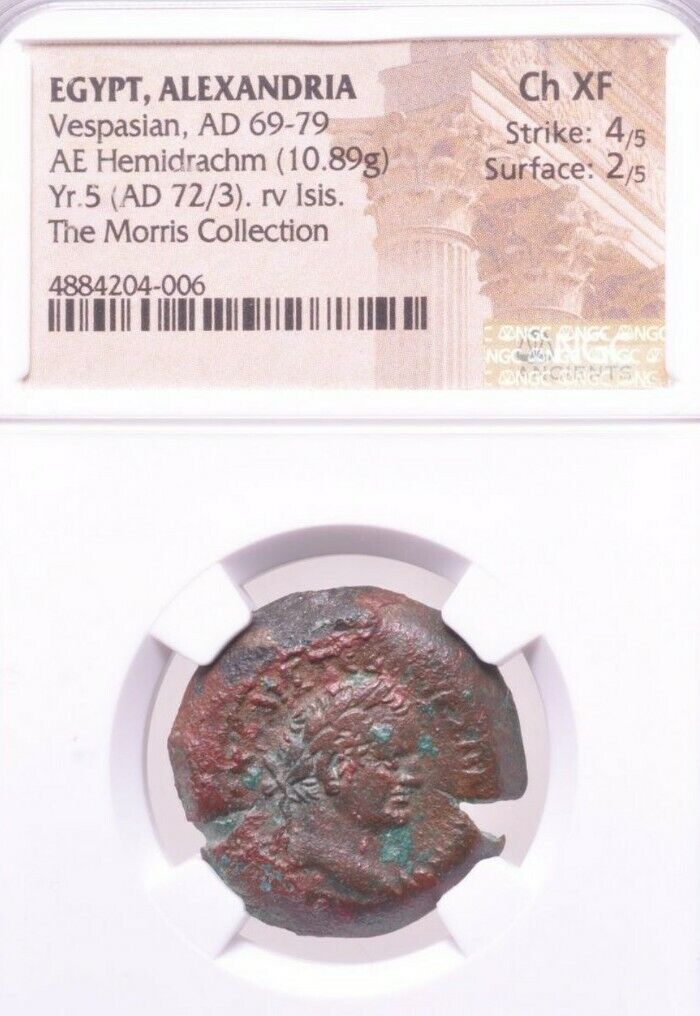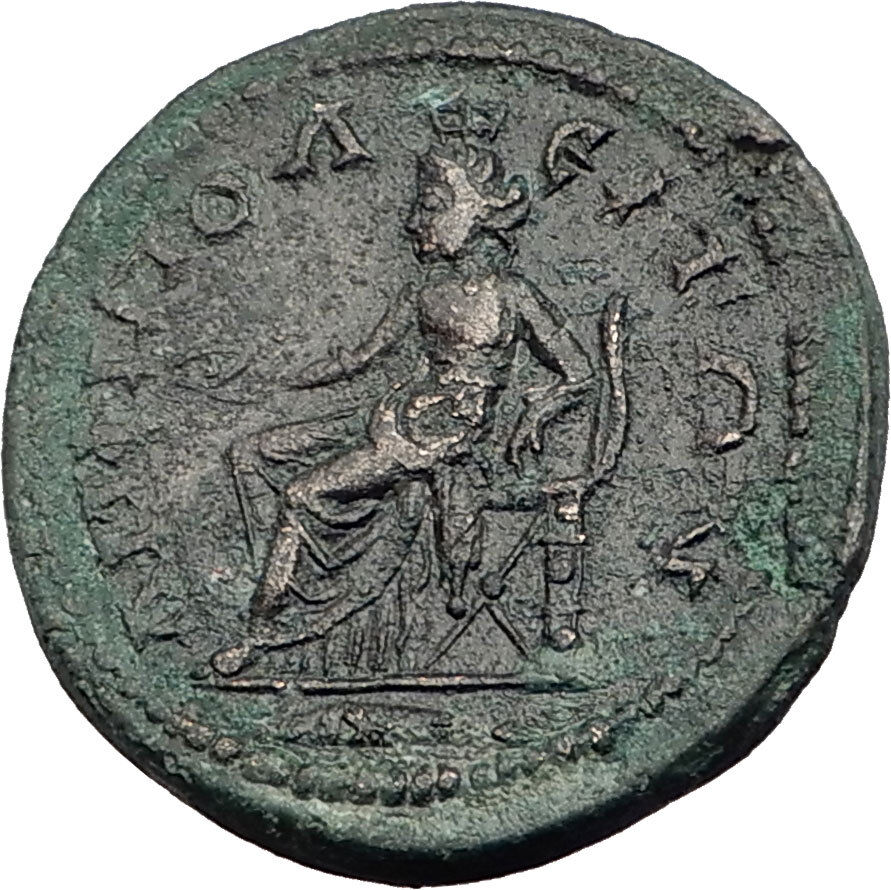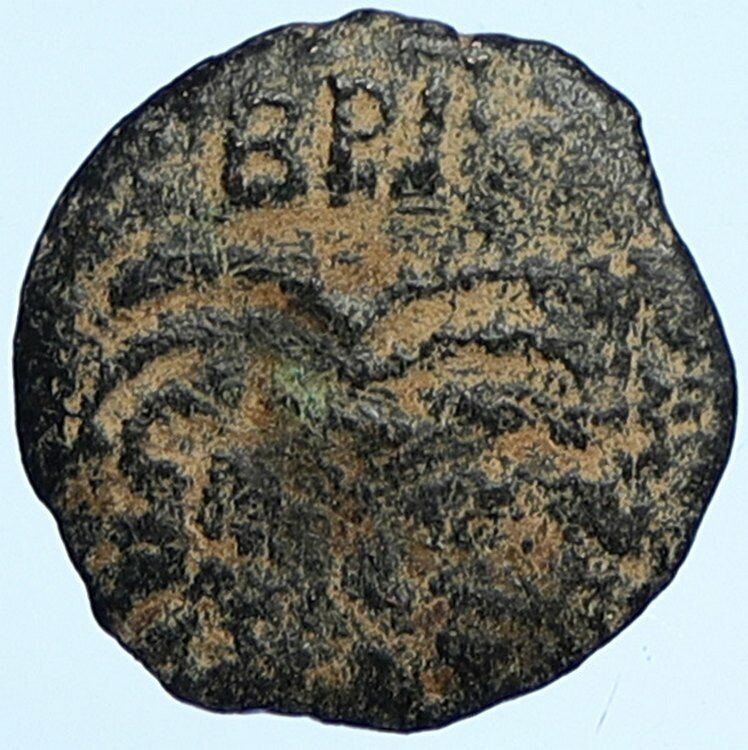-40%
ANTONINUS PIUS 138AD Savatra in Lycaonia Male God Ancient Roman Coin i55732
$ 52.8
- Description
- Size Guide
Description
Item:i55732
Authentic Ancient Coin of:
Antoninus Pius
-
Roman Emperor
: 138-161 A.D.
Bronze 25mm (9.95 grams) of
Savatra
in
Lycaonia
Reference: RPC IV online 7254; SNG France 233; SNG von Aulock, Lycaoniens, 177; SNG Copenhagen 16; SNG von Aulock 5406
AVT KAIC AΔP ANT
Ω
NINOC CE, Laureate head right.
CAOVATP
ЄΩ
N, Male god standing facing, head left, holding reed and two grain ears; at feet to left, fish; to right, small reed.
You are bidding on the exact item pictured, provided with a Certificate of Authenticity and Lifetime Guarantee of Authenticity.
<="" font="" face="Times New Roman">
<="" span="">
Lycaonia
was a large region in the interior of
Asia Minor
, north of the
Taurus Mountains
. It was bounded on the east by
Cappadocia
, on the north by
Galatia
, on the west by
Phrygia
and
Pisidia
, while to the south it extended to the chain of Mount Taurus, where it bordered on the country popularly called in earlier times
Cilicia
and in the Byzantine period
Isauria
; but its boundaries varied greatly at different times. The name is not found in
Herodotus
, but Lycaonia is mentioned by
Xenophon
as traversed by
Cyrus the Younger
on his march through Asia. That author describes
Iconium
as the last city of Phrygia; and in
Acts
14:6
Paul
, after leaving Iconium, crossed the frontier and came to
Lystra
in Lycaonia.
Ptolemy
, on the other hand, includes Lycaonia as a part of the province of Cappadocia, with which it was associated by the Romans for administrative purposes; but the two countries are clearly distinguished both by
Strabo
and Xenophon and by authorities generally.
Etymology
There is a theory that the name "Lycaonia" is a Greek-adapted version (influenced by the Greek masculine name
Lycaon
) of an original
Lukkawanna
, which would mean "the land of the
Lukka
people" in an old
Anatolian
language related to
Hittite
.
Geography
Lycaonia is described by
Strabo
as a cold region of elevated plains, affording pasture to wild asses and to sheep; and at the present day sheep abound, but asses are practically unknown.
Amyntas
, king of
Galatia
, to whom the district was for a time subject, maintained there not less than three hundred flocks. It forms part of the interior tableland of
Asia Minor
, and has an elevation of more than 1000 meters. It suffers from want of water, aggravated in some parts by abundance of salt in the soil, so that the northern portion, extending from near
Iconium
to the salt lake of
Tatta
and the frontiers of Galatia, is almost wholly barren, only small patches being cultivated near Iconium and the large villages. The soil, where water is supplied, is productive. In ancient times great attention was paid to storing and distributing the water, so that much land now barren was formerly cultivated and supported a large number of cities.
The plain is interrupted by some minor groups of mountains, of volcanic character, of which the
Kara Dagh
in the south, a few miles north of
Karaman
, rises to 2288 meters, while the
Karadja Dagh
, north-east of it, though of inferior elevation, presents a striking range of volcanic cones. The mountains in the north-west, near Iconium and
Laodicea Combusta
, are the termination of the
Sultan Dagh
range, which traverses a large part of Phrygia.
History
The Lycaonians appear to have been in early times to a great extent independent of the
Persian empire
, and were like their neighbors the Isaurians a wild and lawless race of
freebooters
; but their country was traversed by one of the great natural lines of high road through Asia Minor, from
Sardis
and
Ephesus
to the Cilician gates, and a few considerable towns grew up along or near this line. The most important was
Iconium
, in the most fertile spot in the country, of which it was always regarded by the Romans as the capital, although ethnologically it was Phrygian. It is still called
Konya
, and it was the capital of the
Seljuk
Turkish empire for several centuries. A little farther north, immediately on the frontier of Phrygia, stood
Laodicea Combusta
(
Ladik
), surnamed
Combusta
, to distinguish it from the Phrygian city of that name; and in the south, near the foot of Mount Taurus, was
Laranda
, now called
Karaman
, which has given name to the province of
Karamania
.
Derbe
and Lystra, which appear from the
Acts of the Apostles
to have been considerable towns, were between Iconium and Laranda. There were many other towns, which became bishoprics in Byzantine times. Lycaonia was Christianized very early; and its ecclesiastical system was more completely organized in its final form during the 4th century than that of any other region of Asia Minor.
After the defeat of
Antiochus the Great
, Lycaonia was given by the Romans to
Eumenes II
, king of
Pergamon
. About 160 BC, part of it, the
Tetrarchy of Lycaonia
, was added to Galatia; and in 129 BC the eastern half (usually called during the following 200 years Lycaonia proper) was given to Cappadocia as an eleventh
strategia
. In the readjustment of the Provinces, 64 BC, by
Pompey
after the
Mithridatic Wars
, he gave the northern part of the tetrarchy to Galatia and the eastern part of the eleventh strategia to Cappadocia. The remainder was attached to Cilicia. Its administration and grouping changed often under the Romans. In 371, Lycaonia was first formed into a separate province.
The ancient coinage of Lycaonia is quite limited. Judging from the number of types/issues known, coins appear to have been struck sporadically and perhaps mostly for prestige or some important occasion (like a visit by the Emperor).
The Lycaonians appear to have retained a distinct nationality in the time of Strabo, but their ethnical affinities are unknown. The mention of the
Lycaonian language
in the Acts of the Apostles (14:11) shows that the native language was spoken by the common people at Lystra about 50; and probably it was only later and under Christian influence that Greek took its place. It is notable though that in the Acts of the Apostles
Barnabas
was called Zeus, and Paul was thought to be Hermes by Lycaonians, and this makes some other researchers to believe that Lycaonian language was actually a Greek dialect, the remnant of which can still be found in the
Cappadocian Greek
language which is classified as a distinct Greek dialect.
Titus Aurelius Fulvus Boionius Arrius Antoninus
(19 September 86 – 7 March 161), generally known in English as
Antoninus Pius
was
Roman emperor
from 138 to 161. He was the fourth of the
Five Good Emperors
and a member of the
Aurelii
. He did not possess the
sobriquet
"
Pius
" until after his accession to the throne. Almost certainly, he earned the name "Pius" because he compelled the
Senate
to deify his adoptive father
Hadrian
; the
Historia Augusta
, however, suggests that he may have earned the name by saving senators sentenced to death by Hadrian in his later years.
//
He was the son and only child of
Titus Aurelius Fulvus
,
consul
in 89 whose family came from
Nemausus
(modern
Nîmes
) and was born near
Lanuvium
and his mother was Arria Fadilla. Antoninus’ father and paternal grandfather died when he was young and he was raised by
Gnaeus Arrius Antoninus
, his maternal grandfather, a man of integrity and culture and a friend of
Pliny the Younger
. His mother married to Publius Julius Lupus (a man of consular rank),
Suffect Consul
in 98, and bore him a daughter called Julia Fadilla.
As a private citizen between 110 and 115, he married Annia Galeria
Faustina the Elder
. They had a very happy marriage. She was the daughter of consul
Marcus Annius Verus
and
Rupilia
Faustina (a half-sister to Roman Empress
Vibia Sabina
). Faustina was a beautiful woman, renowned for her wisdom. She spent her whole life caring for the poor and assisting the most disadvantaged Romans.
Having filled with more than usual success the offices of
quaestor
and
praetor
, he obtained the consulship in 120; he was next appointed by the Emperor
Hadrian
as one of the four
proconsuls
to administer
Italia
, then greatly increased his reputation by his conduct as
proconsul
of
Asia
. He acquired much favor with the Emperor Hadrian, who adopted him as his son and successor on 25 February, 138, after the death of his first adopted son
Lucius Aelius
, on the condition that Antoninus would in turn adopt Marcus Annius Verus, the son of his wife's brother, and Lucius, son of Aelius Verus, who afterwards became the emperors
Marcus Aurelius
and
Lucius Verus
(colleague of Marcus Aurelius).
Emperor
On his accession, Antoninus' name became "Imperator Caesar Titus Aelius Hadrianus Antoninus Augustus Pontifex Maximus". One of his first acts as Emperor was to persuade the
Senate
to grant divine honours to Hadrian, which they had at first refused; his efforts to persuade the Senate to grant these honours is the most likely reason given for his title of
Pius
(dutiful in affection; compare
pietas
). Two other reasons for this title are that he would support his aged father-in-law with his hand at Senate meetings, and that he had saved those men that Hadrian, during his period of ill-health, had condemned to death. He built temples, theaters, and mausoleums, promoted the arts and sciences, and bestowed honours and financial rewards upon the teachers of
rhetoric
and
philosophy
.
In marked contrast to his predecessors
Trajan
and
Hadrian
, Antoninus was not a military man. One modern scholar has written "It is almost certain not only that at no time in his life did he ever see, let alone command, a Roman army, but that, throughout the twenty-three years of his reign, he never went within five hundred miles of a legion".
[2]
His reign was the most peaceful in the entire history of the
Principate
; while there were several military disturbances throughout the Empire in his time, in
Mauretania
,
Iudaea
, and amongst the
Brigantes
in
Britannia
, none of them are considered serious. The unrest in Britannia is believed to have led to the construction of the
Antonine Wall
from the
Firth of Forth
to the
Firth of Clyde
, although it was soon abandoned. He was virtually unique among emperors in that he dealt with these crises without leaving Italy once during his reign, but instead dealt with provincial matters of war and peace through their governors or through imperial letters to the cities such as Ephesus (of which some were publicly displayed). This style of government was highly praised by his contemporaries and by later generations.
Of the public transactions of this period we have scant information, but, to judge by what we possess, those twenty-two years were not remarkably eventful in comparison to those before and after his; the surviving evidence is not complete enough to determine whether we should interpret, with older scholars, that he wisely curtailed the activities of the Roman Empire to a careful minimum, or perhaps that he was uninterested in events away from Rome and
Italy
and his inaction contributed to the pressing troubles that faced not only Marcus Aurelius but also the emperors of the third century. German historian Ernst Kornemann has had it in his Römische Geschichte [2 vols., ed. by H. Bengtson, Stuttgart 1954] that the reign of Antoninus comprised "a succession of grossly wasted opportunities," given the upheavals that were to come. There is more to this argument, given that the Parthians in the East were themselves soon to make no small amount of mischief after Antoninus' passing. Kornemann's brief is that Antoninus might have waged preventive wars to head off these outsiders.
Scholars place Antoninus Pius as the leading candidate for fulfilling the role as a friend of Rabbi
Judah the Prince
. According to the
Talmud
(Avodah Zarah 10a-b), Rabbi Judah was very wealthy and greatly revered in Rome. He had a close friendship with "Antoninus", possibly Antoninus Pius, who would consult Rabbi Judah on various worldly and spiritual matters.
After the longest reign since Augustus (surpassing
Tiberius
by a couple of months), Antoninus died of fever at
Lorium
in
Etruria
, about twelve miles (19 km) from Rome, on 7 March 161, giving the keynote to his life in the last word that he uttered when the
tribune
of the night-watch came to ask the password—"aequanimitas" (equanimity). His body was placed in
Hadrian's mausoleum
, a
column
was dedicated to him on the
Campus Martius
, and the
temple
he had built in the Forum in 141 to his deified wife Faustina was rededicated to the deified Faustina and the deified Antoninus.
Historiography
The only account of his life handed down to us is that of the
Augustan History
, an unreliable and mostly fabricated work. Antoninus is unique among Roman emperors in that he has no other biographies. Historians have therefore turned to public records for what details we know.
In later scholarship
Antoninus in many ways was the ideal of the landed gentleman praised not only by ancient Romans, but also by later scholars of classical history, such as
Edward Gibbon
or the author of the article on Antoninus Pius in the ninth edition of the Encyclopedia Britannicaca:
A few months afterwards, on Hadrian's death, he was enthusiastically welcomed to the throne by the Roman people, who, for once, were not disappointed in their anticipation of a happy reign. For Antoninus came to his new office with simple tastes, kindly disposition, extensive experience, a well-trained intelligence and the sincerest desire for the welfare of his subjects. Instead of plundering to support his prodigality, he emptied his private treasury to assist distressed provinces and cities, and everywhere exercised rigid economy (hence the nickname κυμινοπριστης "cummin-splitter"). Instead of exaggerating into treason whatever was susceptible of unfavorable interpretation, he spurned the very conspiracies that were formed against him into opportunities for demonstrating his clemency. Instead of stirring up persecution against the Christians, he extended to them the strong hand of his protection throughout the empire. Rather than give occasion to that oppression which he regarded as inseparable from an emperor's progress through his dominions, he was content to spend all the years of his reign in Rome, or its neighborhood.
="">="">
Frequently Asked d Questions
How long until my order is shipped?
Depending on the volume of sales, it may take up to 5 business days for shipment of your order after the receipt of payment.
How will I know when the order was shipped?
After your order has shipped, you will be left positive feedback, and that date should be used as a basis of estimating an arrival date.
After you shipped the order, how long will the mail take?
USPS First Class mail takes about 3-5 business days to arrive in the U.S., international shipping times cannot be estimated as they vary from country to country. I am not responsible for any USPS delivery delays, especially for an international package.
What is a certificate of authenticity and what guarantees do you give that the item is authentic?
Each of the items sold here, is provided with a Certificate of Authenticity, and a Lifetime Guarantee of Authenticity, issued by a world-renowned numismatic and antique expert that has identified over 10000 ancient coins and has provided them with the same guarantee. You will be quite happy with what you get with the COA; a professional presentation of the coin, with all of the relevant information and a picture of the coin you saw in the listing.
Compared to other certification companies, the certificate of authenticity is a -50 value. So buy a coin today and own a piece of history, guaranteed.
Is there a money back guarantee?
I offer a 30 day unconditional money back guarantee. I stand behind my coins and would be willing to exchange your order for either store credit towards other coins, or refund, minus shipping expenses, within 30 days from the receipt of your order. My goal is to have the returning customers for a lifetime, and I am so sure in my coins, their authenticity, numismatic value and beauty, I can offer such a guarantee.
Is there a number I can call you with questions about my order?
You can contact me directly via ask seller a question and request my telephone number, or go to my About Me Page to get my contact information only in regards to items purchased on eBay.
When should I leave feedback?
Once you receive your order, please leave a positive. Please don't leave any negative feedbacks, as it happens many times that people rush to leave feedback before letting sufficient time for the order to arrive. Also, if you sent an email, make sure to check for my reply in your messages before claiming that you didn't receive a response. The matter of fact is that any issues can be resolved, as reputation is most important to me. My goal is to provide superior products and quality of service.



